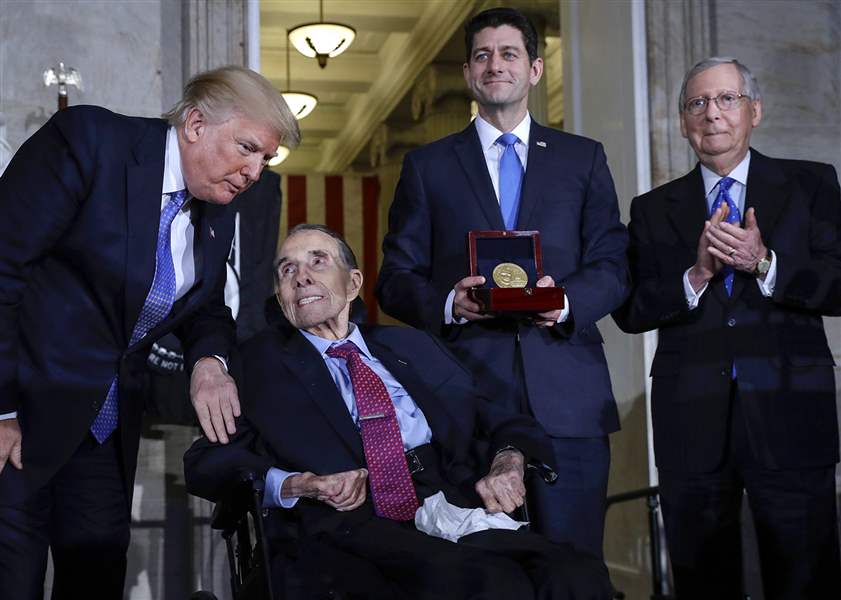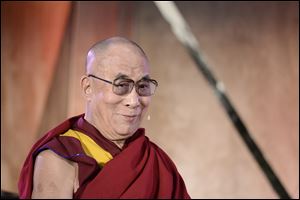
KEITH BURRIS
The Lama and Bob
1/19/2018

President Trump speaks to former Sen. Bob Dole during a Congressional Gold Medal ceremony honoring Mr. Dole on Wednesday.
ASSOCIATED PRESS

One of the teachings of the Dalai Lama is to practice warmheartedness.
I love bumper stickers. I smile at the almost infinite variety of messages and declarations, from the sassy to the profane to the almost, or in some cases absolutely, profound.
My current favorite is this one: “Kindness matters.”
Do you ever feel we have forgotten this is contemporary America?
Especially in the visual and digital channels of talk and chatter?
VIDEO: The joys of warmheartedness
That bumper sticker, which I see on a car parked near mine two or three times a week, at a place of rest and health, sometimes comes to me as a motionless benediction. And it made me more receptive than I might have been when I read of a recent speech by Arthur Brooks, head of the American Enterprise Institute, in which he came up with what to me is the insight of the month, maybe the year.
Mr. Brooks said the problem with American public discourse is not anger, it is contempt.
And he defined contempt this way: The assumption or feeling that the other person has nothing of value to say and is indeed, perhaps because of what he does have to say, someone not to be heard, taken seriously, or given respect — a person of no value.
Bingo.
That is what contempt is: The reduction of the person on the other side of the argument to nothing. I don’t have to listen to you. You are not only wrong, but you are stupid. You are not only stupid, but your stupidity is so profound that you are evil.
Ergo, you and your views are null and void.
Contempt really is what ails us. And it is worse than hate.
Hate is emotional. Contempt is calculated, and it is beyond refutation.
So what is the antidote for contempt?
Mr. Brooks finds it in one of the teachings of the Dalai Lama: Practice warmheartedness.
I think the word practice is key. Warmheartedness doesn’t come naturally or easily.
And how is warmheartedness different than kindness?
Well, one might say that kindness is the flower, whereas warmheartedness is the sun, rain, and earth that nourish the attitude and the acts of kindness.
Mr. Brooks says that kindness can not only change families and marriages, it can change our politics. Upon this contention most of his fellow Washingtonians bestow another kind of benediction — the smile of condescension.
How to replace a culture of contempt when the combatants will not recognize the power of kindness?
We must convince each other that kindness is more pragmatic than contempt, which corrodes the soul. Warmheartedness and kindness feed it.
Our politics has not been ever thus. I watched a ceremony to honor former Sen. Bob Dole the other day — he was given the Congressional Gold Medal — and was reminded, once again, that comity once existed at the highest levels of American statecraft. Comity, defined as “courtesy and consideration towards others.”

President Trump speaks to former Sen. Bob Dole during a Congressional Gold Medal ceremony honoring Mr. Dole on Wednesday.
But, at those high levels, comity used to mean even more: It meant respect. The respect emanated from what we used to call, in old political science texts, “the “folkways of the Capitol.” Not only did members of Congress address each other as “the gentleman from Minnesota,” or “the lady from Maine,” and not only did members not trash each other in debate, but they ate and drank together and, ultimately, worked together. They knew each other. And it’s hard to have contempt for someone you really know — especially if he has extended kindnesses or courtesy toward you.
Bob Dole, now frail at 95 (though he hefted himself out of his wheelchair for the national anthem and the parading of the colors), epitomized comity when he ran the Senate as majority leader. Democrats, like Dianne Feinstein, wax nostalgic for his day. But he was anything but a cream puff. He was a hard, tough political infighter for all his active political career. Indeed, as a young man, he was often a fierce partisan. Yet he played fair, didn’t personalize his politics, and, as he aged, he built friendships across the political divide.
That was possible because of one other quality that nourishes kindness and comity: The ability to change one’s mind.
Bob Dole changed his mind about a lot of people and a few issues. And some of the people who honored him the other day, directly or indirectly, changed their minds about Bob Dole. In 1976, as Jerry Ford’s running mate, Mr. Dole was widely considered an extremist, a nasty man, “the prince of darkness.” I recall well the number of people who told me at the time: “We just can’t have Dole a heartbeat away.”
Minds change. People change. If we forswear the possibility of changing our minds, warmheartedness, comity, and mutual respect will never win out.
Keith C. Burris is editorial page editor of The Blade. Contact him at kburris@theblade.com or 419-724-6266.